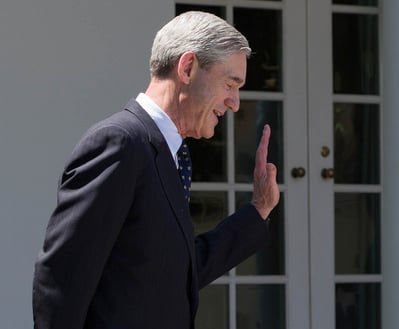Just as Special Counsel Mueller‘s probe has begun to wind down, a new debate is ramping up: What if the public never gets to see his report?
That question—and the fate of Mueller’s findings—has taken on outsize importance with the nomination of William Barr to become Attorney General, whose commitment to releasing Mueller’s findings has appeared lukewarm at best. But aside from Barr’s testimony, the prospects for the Mueller report may be up in the air for a different reason, according to several legal experts who spoke with Washingtonian.
The cause for this anxiety: An obscure lawsuit, recently argued in a D.C.courtroom, whose outcome could set the legal parameters for how much the public gets to know about what Mueller finds—or whether we find out much at all.
The case, called McKeever v. Sessions, hinges on how a court can interpret the level of secrecy attached to grand jury testimony. In most cases, such testimony is sealed permanently; exceptions are rare, such as in cases where all relevant witnesses have long since died. The secrecy can be honored even in matters of pressing national interest: Last year, lawyers asked a court to unseal documents pertaining to the Watergate scandal that had not been successfully unsealed for more than forty years.
McKeever presents a similar situation. In 2013, Stuart McKeever, then a 76-year-old novelist living in South Carolina, was working on a true-crime book that chronicled the 1956 disappearance of a Columbia University professor. McKeever was particularly interested in a man suspected of murdering the professor, but never charged. The key to the case might have been hidden in the grand jury records, still sealed from the investigation into the professor’s disappearance.
That was the problem: The grand jury records—thousands of pages—were sealed. So McKeever filed a motion in the D.C. District Court to release them, apparently planning to use the records in order to finish his book.
It’s sort of uncharted waters,” says Whiting. “If McKeever goes the way the Justice Department argues, it could become a very serious impediment
Typically, any disclosure of grand jury records is strictly bound by a series of requirements known collectively as Rule 6, which refers to the Federal Rules of Criminal Procedure. McKeever, who retired after a long career as an accomplished public interest attorney, probably knew his request didn’t qualify under those strict standards. So instead, he argued that courts have inherent authority to release grand jury records: If the records remain in court possession, judges have the power to release them, with good cause, when they please.
McKeever wasn’t crazy to argue this. Three circuit rulings have similarly held that courts have this inherent authority. But some legal scholars say the issue isn’t considered fully settled law. And in 2013, the district court actually agreed with Stuart McKeever: Courts do have an “inherent” authority to release grand jury material. But the court ruled against McKeever anyway—as if to say, in essence, that a moonlighting, self-published novelist (Kirkus called his previous work “a meandering, cross-country novel” that “rushes its epiphanies”) does not qualify for such an extraordinary action. So the South Carolinian was barred from seeing the grand jury documents after all.
Soon after, McKeever appealed the decision. It was still President Obama’s first term in office when McKeever filed his lawsuit—back in the days when Robert Mueller was Director of the FBI, and Donald Trump passed his days tweeting praise for the New York Times and The Apprentice. McKeever’s appeal process lasted several years. By the time his case was finally heard in the D.C. Circuit Court of Appeals (two floors above where Mueller’s grand jury convenes) in September 2018, it arrived just in time for the octogenarian’s literary druthers to collide head-on with the most high-stakes political drama since Watergate.
The ruling is expected to come down this spring. While McKeever is arguing for the broadest interpretation of judicial power, the Justice Department has argued for the opposite—the strictest possible interpretation of Rule 6(e), which would reject “a court’s inherent authority to circumvent the rules of criminal procedure.”
And that’s where things get sticky for Bob Mueller.
Legal experts have wondered what might happen if William Barr, then acting as Attorney General, refuses to release Mueller’s report to the public (or to Congress). Some scholars think that an option of last resort might be to petition a court to release the thousands of pages of grand jury testimony, which Mueller’s team has amassed during its two years of investigation. These documents might not be the perfect equivalent of a concise “Mueller report,” and would lack the Special Counsel’s recommendations and analysis. But presumably, the records would tell much the same story. In this scenario, the court would grant the request, and release the grand jury records for review.
The question at the heart of McKeever is: Can a federal court actually do that?
“It’s sort of uncharted waters,” says Alex Whiting, a professor at Harvard Law School. “If McKeever goes the way the Justice Department argues, it could become a very serious impediment” to the public seeing a detailed report from Mueller.
Whiting pointed out that there are still plenty of ways that catastrophe could be skirted. The most immediate is for a narrow ruling by the court, or a legal punt, sending the case back to a lower court. Another option, though time-consuming and potentially vulnerable to claims of executive privilege, is for Congress to simply subpoena Mueller’s targets, who are under no requirement of secrecy. And yet another way is for Mueller to ask a judge to transmit grand jury materials confidentially to Congress—exactly what Watergate Special Prosecutor Leon Jaworski did in 1974, a move upheld in the case Haldeman v. Sirica. But that case, too, has its dissenters who say the matter is not firmly settled law, much less cemented in Supreme Court precedent.
If a constitutional showdown is coming over Mueller’s report, then, it could be a battle “that ultimately may require Supreme Court resolution”—one in which the octogenarian’s book could play a pivotal role.
Whiting doubts that will happen. But, he acknowledges, “it is conceivable.” If McKeever’s case somehow contributes to the burying of Mueller’s report—or at least provides the firepower to those who wish to bury it, like Barr—it could present the legal equivalent of the Chicago Cubs fan who accidentally robbed his own team of a game-winning out. (When this sports analogy is mentioned, Whiting groans, “You mean Steve Bartman”—referring to the fan who etched his name in baseball infamy. Whiting is from Chicago.)
No matter the outcome, the six-year federal case will be freighted with this irony: McKeever already published his book—years ago, in fact, and without the grand jury material for which he longed. Printed with the help of the self-publishing website AuthorHouse, it currently ranks 21,535,395th on Amazon’s sales list. Foreward Reviews, to which authors pay a fee to have their work reviewed, wrote that the book, while extensively researched, “struggles under the weight of too much extraneous information and unnecessary repetition.”
It received three out of five stars.



















